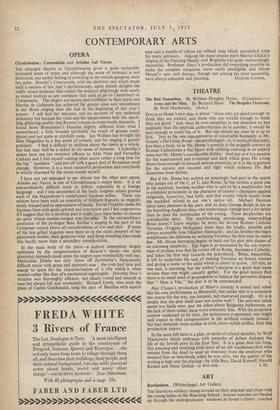THEATRE
The Bad Samaritan. By William Douglas Home. (Criterion)— Arms and the Man. By Bernard Shaw. The Bespoke Overcoat. By Wolf Mankowitz. (Arts.) DOUGLAS HOME'S new play is about "those who ire good enough to think they are wicked, and those who are wicked enough to think they are good," and, since he over-simplifies in one direction no less zealously than the spiritual authoritarians do in another, it would be easy enough to make fun of it. But one shbuld see what he is up to first. 'Just as the one representative of reasonable humanity in Mr. Greene 's The Living Room—the psychologist—is, in termkof character, less than a husk, so in Mr. Home's comedy is the priggis'h convert to Roman Catholicism a flat figure with nothing coursing in its papery veins but Mr. Home's considerable dislike. And just as it is a passion for the supernatural and irrational and dark which gives The Living Room force enough to demand serious attention, so it is the argument for the natural and rational and light which redeems The Bad Samaritan from failure.
But if Mr. Home has written an amazingly bad part in the zealot who jumps out of the C. of E. into Rome, he has written a good one in the sceptical, humane brother who is said to be a stockbroker but is exhibited principally in the character of reason's champion against religiosity, hypocrisy, bad faith, and that cruelty which results from the muddled refusal to use one's native wit. Michael Denison takes keen pleasure in his part, and so does George Relph in his as the bumbling Anglican dean who understands vintage port a lot better than he does the perplexities of the young. These perplexities are considerable here. The stockbroking, paradoxing, wisecracking Brian doesn't know whether he loves the devout Roman Catholic Veronica (Virginia McKenna) more than the kindly, sensible and always accessible Jane (Heather Stannard) ; and his brother the bigot complicates the dilemma by seducing Veronica the first time he meets her. Mr. Home hereupon begins to hack out his plot into shapes of an alarming simplicity. The bigot is so nauseated by his one experi- ence of profane love that he rushes off to Rome, becomes a Catholic, and takes the first step towards the priesthood. Brian, meanwhile, is left to undertake the task of making Veronica an honest woman and giving a name to the child which is about to arrive. All this, as one said, is alarming, but the author's purpose is a good deal more serious than one might casually gather. For the good reason that there is no small need of propaganda to balance the pervasive slogans that " Man is Vile," the play is to be commended.• Alec Clunes's production of Shaw's comedy is sound and sobei like his own performance as Bluntschli, but unlike that it is somehow too coarse for the text, too lumpish, not mannered enough. Or is it simply that the play itself does not revive well ? The anti-war satire seems too facile now, and the jokes about Bulgarian bathrooms, o; the lack of them rather, have worn extremely thin. With the purposive content weakened so by time, the seriousness evaporated, one might well expect to find compensation in the artificial comedy instead • but that demands more artifice in style, more stylish artifice, than this production enjoys.
In the same bill there is a play, or series of related sketches, by Wolf Mankowitz which embraces with tentacles of deftest dialogue the life of the Jewish poor in the East End. It is a great deal too long, this amusing and touching little story of an old warehouse clerk who returns from the dead to steal an overcoat from the employer who sweated him so heartlessly when he was alive, but the quality of the writing is high and the playing—by Alfie Bass, David Kossoff, Harold Kasket and Oscar Quitak—is first-rate. I. H.


























































 Previous page
Previous page